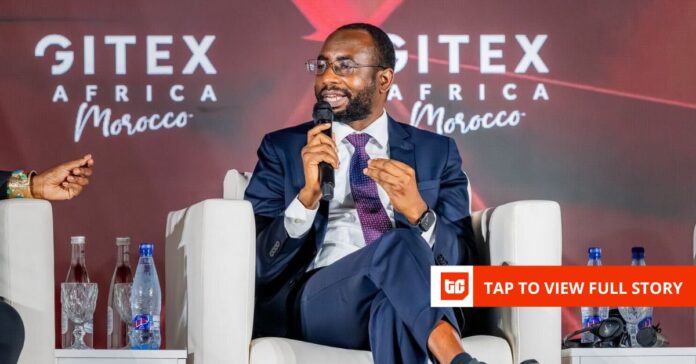Nigerian tech ambitions were in full display at GITEX Africa this week in Morocco. The National Information Technology Development Agency, or NITDA, pitched to an international audience how artificial intelligence in Nigeria, as well as cybersecurity, will shape the next phase of the country’s digital transformation.
Kashifu Inuiwa, NITDA Director General, argued for the integration of AI as a strategic layer for leadership and policy implementation for governments and businesses in Africa.
He said that AI is changing the skills and processes we use in our daily work. This was during a panel discussion on the main stage of the conference on Tuesday, April 15th. “To be a leader who is AI-driven, you must find a way to utilize AI to create cointelligence. This means bringing people and computers together to achieve your strategic vision,” he said.
This is a bold proposal for a nation that struggles with fundamentals like broadband coverage and limited digital technology. NITDA is betting that a top-down approach will position Nigeria, and by extension Africa, as a global leader in AI governance and innovative technology. Bosun Tijani, Nigeria’s Minister for Communications, Innovation and Digital Economy, launched the National Artificial Intelligence Strategy (AI) in Lagos on Tuesday, April 15.
Nigeria’s AI push is backed up by government ambition and funded by international partners. In October 2024 the ministry Google announced an N2.8 billion grant to promote AI talent in Nigeria. Critics have said that Nigeria must first address fundamental issues such as reliable power, food security and poverty. The country’s leaders see AI as an historic opportunity to stake a claim in the global tech industry.
Inuwa said on the panel that “we missed the first, the second, and the third industrial revolutions but we must lead this fourth one and not just follow.”
Not only AI, but cybersecurity as well
Along with its AI pitch, NITDA also signed a Memorandum of Understanding (MOU) with SecDojo SAS, a France based cybersecurity training and upskilling firm, for targeted capacity building initiatives. This is part of the regulator’s efforts to improve Nigeria’s cyber resilience. According to Check Point Software Technologies December 2024 Global Threat IndexNigeria is ranked 13th most vulnerable to cyberattacks.
This deal will support the establishment of a cybersecurity school in Nigeria with training programs, simulator environments, and curriculum to fill the global cyber talent shortage.
Inuwa stated at the MoU signing on Monday, April 14, that “Globally, there is a gap and in Nigeria we have a youth population which if we harnessed well, we could train them and connect with the global value-chain to provide cybersecurity services as well as to fill some roles in the global cyber-security market.”
The Nigerian government has a long-standing tradition of exporting digital talent, as evidenced by the Three Million Technical Talents (3MTT) program. The need for talent and sustainability are both real. Inuwa himself stated that Nigeria’s current digital skill training is delivered primarily through short-term acceleration programmes. He is now pushing for integration in the formal education system.
He said that to prepare for the future we must embed these skills in our national education framework, pointing out Cisco’s model of integration academics in Nigerian Universities as a possible template.
Nigeria presented its case in Marrakesh. It will depend on the situation at home whether it sticks.


